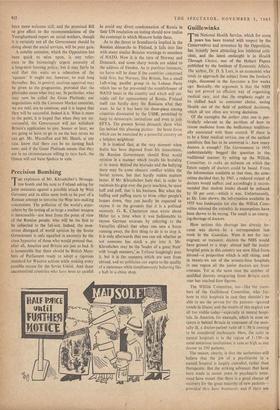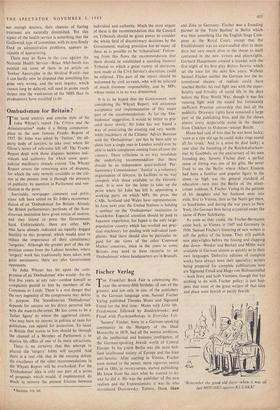Guillewinks
THE National Health Service, which for some years has been treated with respect by the Conservatives and reverence by the Opposition, has recently been attracting less inhibited criti- cism; and the latest onslaught is in Health Through Choice, one of the Hobart Papers published by the Institute of Economic Affairs. The author, Dr. D. S. I.ees, is an economist who tends to approach the subject from the Jewkes's angle, discussed in the Spectator a few weeks ago. Basically, the argument is that the NHS has not proved an efficient way of organising medical care; and that the emphasis ought to be shifted back to consumer choice, easing Health out of the field of political decisions, which all too often are wrong decisions.
Of the examples the author cites one is par- ticularly relevant to the problem of how to rescue medicine from the inefficiency tradition- ally associated with State control. If there is to be .a State medical service, one of the earliest questions that has to be answered is: how many doctors is enough? The Government in 1955, understandably begged the question in the, traditional manner by setting up the Willink Committee, to make an estimate on which the future supply of doctors could be based. From the information available at that time, the com- mittee decided that, by 1961, a reduced output of doctors would suffice: and accordingly it recom- mended that student intake should be reduced by 10 per cent.—which it was. Unfortunately, as Dr. Lees shows, the information available in 1955 was inadequate (or else the. Willink Com- mittee misread the entrails); its assumptions have been shown to be wrong. The result is an emerg- ing shortage of doctors..
How serious this shortage has already be- come was shown by a correspondent last week in the Guardian. Were it not for im- migrant, or transient, doctors the NHS would have ground to a stop: almost half the junior' hospital posts in this country are now filled from - abroad—a proportion which is still rising; and in twenty-six out of the seventy-four hospitals in one region all the junior doctors are from overseas. Yet at the same time the number of qualified doctors emigrating from Britain each year has reached four figures.
The Willink Committee, too—like the mem- bers of the Guillebaud Committee, who for- bore to visit hospitals in case they shouldn't be able to see the service for the patients—ignored trends in illness; and the results of this neglect are all too visible today—especially in mental hospi- tals. In America, for example, which in most re- spects is behind Britain in treatment of the men- tally ill, a doctor-patient ratio' of 1: 50 is coming to be considered inadequate. Here, the ratio in mental hospitals is in the region of 1:150—in some notorious institutions, it runs as high as one doctor to 250 patients.
The reason, clearly, is that the authorities still believe that the job of a psychiatrist in a mental hospital is largely custodial, rather than therapeutic. But the striking advances that have been made in recent years in psychiatric treat- ment have meant that there is a good chance of recovery for the great majority of new patients-- provided they have treatment; and if there are not enough doctors, their chances of having treatment are naturally diminished. Yet this aspect of the health service is something that the Guillewink type of committee, with its eyes firmly fixed on administrative problems, appears in- capable of appreciating.
There may be flaws in the case against the National Health Service—Brian Abel-Smith has pointed out some of them in an article on 'Jewkes' Apocrypha' in the Medical World--but it can hardly now be disputed that something has gone very wrong; and the next inquiry, which cannot long be delayed, will need to probe much deeper into the weaknesses of the NHS than its predecessors have troubled to do.















































 Previous page
Previous page